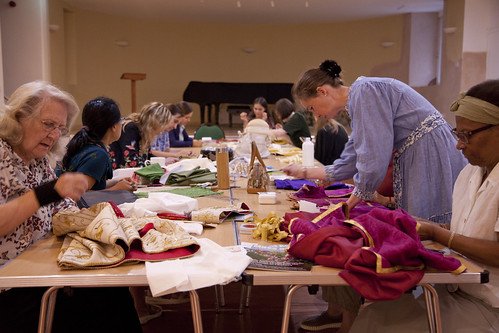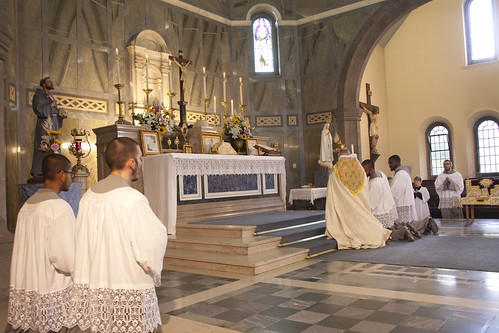Chairman's Blog
Mass in Dundee
Conversation with 'Learn Latin'
The other day I had a live conversation with Diego of @latinedisce Learn Latin, on a Twitter 'space'.
LMS Annual General Meeting: photos
Two more petitions to save the Traditional Mass: in the Catholic Herald
48 Public figures support the Traditional Mass: materials
 |
| The Latin Mass Society's Annual Requiem in 2023, in Corpus Christi Maiden Lane |
George Galloway on the Traditional Mass
.jpg) |
| George Galloway: Official photo from the UK Parliament |
Cross-posted from Rorate Caeli.
This has emerged in an interview with Timothy Stanley in the Daily Telegraph. Galloway, who is seeking re-election as the Member of Parliament for Rochdale in England's north west, noted that he is a practicing Catholic, and a 'big fan' of Pope Francis.
Stanley, a Catholic convert who also has experience of the radical left, felt inspired to ask him about the Traditional Mass.
The article is paywalled (here) but this is the money quote:
“I’m in favour of it.” George calls it “poetry in motion”. Has he heard the rumour that the Pope is thinking of banning it? “We discussed that.” Did he advise His Holiness against a prohibition? “I did.” But he doesn’t think it will happen: “A lot of things that have emerged from the Pope are actually collegiate positions… He has a lot of enemies, so he has to rely on different factions. It’s a very back-stabbing place, rather like Parliament.”
Older readers in the US might possibly remember Galloway's testimony before Congress in 2005. In Britain, he is very well known as the foremost representative of the radical left, stranded by the Labour Party's move towards globalist managerialism. It would be simplistic to call Galloway 'Old Labour', because of his successful navigation of the new politics of ethnic minorities and Islam, but this is part of his identity, and as such he even calls himself 'socially conservative'. It is a fact that were the great Labour politicians of the past to rise up and repeat what they regarded as common sense about social issues fifty years ago, they would be denounced as 'far right' by some.
Galloway's intervention is a reminder that the Traditional Mass is not limited by party, educational background or class. It appeals to all kinds of people, and once served as an unbreakable bond of solidarity in a Catholic community with a range of ideas about how to implement the Church's teaching in the secular sphere.
One early proponent of the Traditional Mass was s founder of Plaid Cymru, the Welsh nationalist part: Saunders Lewis. There is an article about him in the current Mass of Ages, the magazine of the Latin Mass Society. Another, Hugh Ross Williamson, had also, like Galloway, once been ejected from the Labour Party for his radicalism.
Let us hope that Pope Francis, recognising in Galloway a political soul-mate, will take his words about the Traditional Mass to heart. I understand Pope Francis has had the same advice from a Parliamentarian from the other end of the party-political spectrum: the senior Conservative backbencher and specialist in Italian affairs, Sir Edward Leigh, who is also a patron of the Latin Mass Society.
The Sign of Peace, for Catholic Answers
 |
| The Kiss of Peace at the LMS Walsingham Pilgrimage 2023: High Mass in the Shrine |
The Sign of Peace, the handshake that takes place at Sunday Mass between the Our Father and the Agnus Dei (Lamb of God) before Holy Communion, is sometimes a source of friction and confusion.
The friction derives from the experience of it getting out of hand—being disruptive and even an intrusion. These problems were serious enough to raise the question, at the 2009 Synod of Bishops in in Rome, of moving the Sign of Peace to before the Offertory. Here, I want to shed some light on the meaning of the rite, which helps to put the question into some context.
 |
| At the LMS Annual Mass of Reparation in Bedford. |
Learn Latin this Summer!
In person teaching (more here)
- An intensive course to make the most of your time
- Based on the Latin of the Traditional Mass
- Three tutors to make sure everyone has exactly the level of Latin instruction they need
- Daily Traditional Mass celebrated by our chaplain
- A Catholic ethos
- 80% discount for clergy and seminarians
- 50% discount for students
- Another £55 off for LMS members
More information and booking here.
"I cannot thank you enough for organising this course."
"A good diversity of liturgical texts—I was particularly pleased that we did most of the Roman Canon. Participants learned a lot and had a good time."
"I found the level challenging, but not overwhelming—just right for me."
"I’ve been twice to the course now and enjoyed it, I convinced another seminarian to join me this year. I will probably come back next year…"
Like the residential course, the Latin Mass Society provides a 80% discount for clergy and seminarians from England and Wales to take part.
The LMS is now able to support two very different but complementary ways of learning Latin.
“Live” instruction: Whether you are an absolute beginner or a more experienced Latinist who is returning to the language, after some time away, you can now join an expressly designed live class — run by Peter Day-Milne. He has taken over these groups from Matthew Spencer and brings to the table a carefully arranged series of sessions (both for beginners and intermediate students). More details, including how to sign up, can be seen at latinexplained.com.
“Self study / asynchronous” method: This is Matthew and Peter's budget option, designed to fit the needs of those who wish to study in their own time. For no more than £50 you can be introduced to all the grammar of four classic prayers via our “Latin shots” — not a jolt of caffeine but a dose of expertly introduced grammar to set you on your way. The four prayers covered at present are: Regina Caeli (the Marian antiphon for Eastertide); Salve Regina; Ave Maria and of course the Pater Noster. If you want some bespoke feedback, an encouraging word from a Latinist by email to make sure you’re on track, the charge is no more than £75 for 16 weeks of (32) videos — otherwise the course can be done independently.
Both methods — live class and self study — are interoperable. You might start off on one and then switch to the other. For example, the more immersive free flowing approach of “Latin shots” might be a good way to refresh the nervous system after those all important weeks formally studying grammar by way of a dedicated live class — though please note that attention to grammatical detail is, ultimately, a preoccupation of all our provision, even if Matthew’s and Peter’s ways of approaching grammar are naturally different.
 |
| The Traditional Mass in Park Place Pastoral Centre on a previous occasion. |
Getting men to Mass: for Catholic Answers
 |
| Men outnumber women at the LMS Walsingham Pilgrimage: sign up here! |
In the United States, in England, and across the developed world, women outnumber men in Catholic churches on Sundays. (Figures over time in the USA can be seen here; a worldwide study can be seen here.) The phenomenon got a mention in Pope St John Paul II’s 1988 post-synodal exhortation Christifideles laici 52: “various sectors in the Church must lament the absence or the scarcity of the presence of men.” Despite this, there seems to be much more discussion of the lapsation of women in the Church, and far more concern is expressed about teachings and liturgical practices that might put women off.
Male Catholics might be forgiven for forming the impression that the Church’s hierarchy and commentariat do not, in general, view their disappearance from Mass as very important. Certainly, there are some voices that seem more eager to use the absence of men as an argument for the ordination of women than to do anything to redress the imbalance.
 |
| We also have female-dominated events! Sign up for the next Guild of St Clare Sewing Retreat here, or join us in London this Saturday. |















